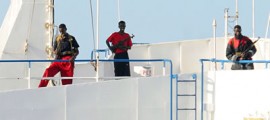
It is harder to enforce the law at sea than on land. The notions of territory and sovereignty are applied in a different way. There are two current news stories that illustrate this principle.
First, there are the ships in the Indian Ocean sailing past the coast of Somalia, continually under the threat of pirate attack. The ships themselves and their cargoes are enormously valuable – the Sirius Star captured in November last year contained 2 million barrels of oil worth $100 million – and are also extremely vulnerable. Squads of men with machine guns and rocket launchers can come alongside a large cargo ship in their fast-moving small boats and then swarm aboard, overpowering the crew in the process. Civilian vessels are not allowed to carry weaponry, so they are an easy target.
The world’s navies have deployed warships to the region to try to protect merchant shipping on the valuable routes from the Persian Gulf through to the Red Sea and Suez Canal or south to the Cape of Good Hope, but the vast expanse of ocean is hard to control.
Both the French and Americans are reported recently to have used force against pirate boats, to free hostages and repel boarders. There are Somali pirates under arrest who may well face trial in France for their attack on a French ship. The mixture of legal jurisdictions is a complicated one, in the case of incidents in international waters caused by boats based in a lawless land such as Somalia. Where will redress be sought if an attempt to rescue hostages should go wrong? It is hard to see how a patchwork of national efforts can bring the pirates to book.
Closer to home, French fishing boats are blockading ferries in the Channel ports, with ludicrous demands that their fishing quotas should be increased. It can’t be acceptable that the movement of passengers and freight can be obstructed so readily (I would write this even if the protesters wanted their quotas reduced) and there are legal authorities with the power to act. Furthermore, the French government is even prohibited by European law from taking a relaxed view of the protests because the main victims are British. A ship is a ship, and a passenger is a passenger.
The whole notion of piracy is founded on the idea of life outside the law. It is when you see the consequences of that notion that the true importance of the rule of law becomes clear.
